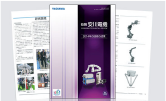Internal control system
Basic Approach to the Internal Control System and Development Status
Pursuant to the Companies Act and the Ordinance for Enforcement of the Companies Act, Yaskawa Electric’s Board of
Directors provides as follows for “A system for ensuring that the execution of duties by directors complies with
laws and regulations and the articles of incorporation, and other systems for ensuring that the business of the
company is appropriate” (so-called “Basic Policy for the Internal Control System”). Thereby the corporate group
(hereinafter referred to as “Yaskawa Group”.) consisting of Yaskawa Electric and its subsidiaries respond
appropriately to social requirements and make continuous improvements.
1. A system to ensure that the execution of duties by directors and employees of the Yaskawa Group complies
with laws and regulations as well as the Articles of Incorporation, and a system to ensure the appropriateness
of business operations
(1) Yaskawa Electric has established the “Group Principle of Management” and the “Guidance on Yaskawa Group Code
of Conduct” to ensure that all directors and employees of the Yaskawa Group comply with laws and regulations and
behave with good social sense, and strives to ensure thorough awareness of these matters.
(2) In order to ensure the reliability of financial reporting in the Yaskawa Group, Yaskawa Electric enhances
its operations by developing, operating and evaluating internal controls over financial reporting.
(3) Yaskawa Electric appoints several highly independent outside directors to enhance the board’s ability to
supervise the directors’ performance of their duties.
(4) The Yaskawa group defines the authority of the managerial level and clarify the authority of the managerial
level.
(5) The Yaskawa Group clarifies the division of duties and authority based on the division of duties and
authority to make decisions.
(6) Yaskawa Electric draws up the Group’s mid-term business plan and management plans for each fiscal year. The business objectives and management strategies are reflected in the business objectives of each division as a whole. In addition, their progress is reported and evaluated periodically.
(7) Yaskawa Electric manages the Yaskawa Group’s accounting, including budgeting and performance
management.
(8) Based on the “Rules for Management of Affiliated Companies” Yaskawa Electric establishes a division to
supervise the management of the Yaskawa Group companies as well as a division to supervise the business.
(9) Yaskawa Electric receives reports on the status of business execution from Yaskawa Group companies and
provides guidance, advice and consultation as necessary.
(10) Yaskawa Electric’s Internal Audit Department conducts internal audits of the Yaskawa Group.
(11) The Yaskawa Group develops a compliance system based on the “Basic Rules for Group Compliance”.
(12) Yaskawa Electric establishes a Compliance Committee to discuss and decide on important compliance-related
matters.
(13) When a misconduct occurs within the Yaskawa Group, the Compliance Committee takes the lead in investigating
and reporting important matters to the Executive Committee, the Board of Directors and the Audit and Supervisory
Committee of Yaskawa Electric.
(14) The Yaskawa Group establishes an internal reporting system “Compliance Hotline” with the compliance
departments of each company and an external third-party organization working as contact points.
2. System for storing and managing information related to the execution of duties by directors of the Yaskawa Group
(1) The Yaskawa Group prepares, stores and manages minutes of meetings of the Board of Directors based on the
“Rules of the Board of Directors”.
(2) The Yaskawa Group stores and manages information related to approval applications based on the “Rules for
Application for Approval and Reporting Procedures”.
(3) Yaskawa Electric shall communicate with shareholders and society at large and disclose corporate information
in a timely and fair manner.
3. Regulations and other systems concerning the management of the risk of loss of the Yaskawa Group
(1) Based on the “Basic Rules for Crisis Management” Yaskawa Electric clarifies its daily preparations and basic
policies in the event of a crisis.
(2) Yaskawa Electric establishes a Risk Management Committee to establish a company-wide risk management system
and manage risks.
(3) Based on the “Basic Rules for Crisis Management” Yaskawa Electric clarifies the Yaskawa Group’s daily
preparations and basic policies in the event of a crisis. The Risk Management Committee also establishes a risk
management system for the Yaskawa Group and provide advice and guidance.
4. System to ensure the efficient execution of duties by directors of the Yaskawa Group
(1) Yaskawa Electric establishes a system to promote the efficient execution of duties by directors in the
Yaskawa Group.
(2) The Yaskawa Group defines the authority of the management positions and the authority of the management
support positions, and defines duties and employee duties by resolution of the Board of Directors to clarify the
division of duties between directors.
(3) Yaskawa Electric establishes an executive officer to separate management decision-making and business
execution functions, enhance their respective functions and expedite business execution.
(4) In order to promote the efficient execution of duties based on decision making by directors, the Yaskawa
Group clarifies the division of duties and authority of management and department heads based on organizational
rules, etc.
(5) The Yaskawa Group organizes an Executive Committee consisting of executive directors, executive officers,
etc., to discuss matters requiring prior consultation among the matters resolved by the Board of Directors and
important decisions for business execution.
5. Matters concerning employees who are to assist the duties of the Audit and Supervisory Committee of our company,
matters concerning the independence of such employees from directors(excluding directors who are Audit and
Supervisory Committee Members), and matters concerning the effectiveness of the Audit and Supervisory Committee’s
instructions to such employees
(1) Yaskawa Electric establishes a secretariat and dedicated staff to assist the work of the Audit and
Supervisory Committee. Such staff shall perform their duties under the direction of the Audit and Supervisory
Committee.
(2) Yaskawa Electric consults with the Audit and Supervisory Committee in advance regarding matters related to
the authority to appoint, transfer, etc. staff of the Audit and Supervisory Committee and their performance
evaluation. In selecting such staff, due consideration should be given to their experience and knowledge.
6. Yaskawa Electric’s system for reporting to the Audit and Supervisory Committee
(1) If any director, auditor or employee of the Yaskawa Group discovers any fact that may cause substantial
damage to the Yaskawa Group, such fact shall be immediately reported to the Audit and Supervisory Committee
through the designated section.
(2) Yaskawa Electric’s audit and supervisory committee members can attend important internal meetings.
(3) Documents related to important decision-making, such as internal approval applications, are circulated to
Yaskawa Electric’s Audit and Supervisory Committee Members.
7. System to ensure that a person who has made a report to the Audit and Supervisory Committee of Yaskawa Electric
is not treated disadvantageously on the grounds that he/she has made the said report
The Yaskawa Group prohibits, in its internal rules, etc., disadvantageous treatment of a reporter for reason of
reporting to the Audit and Supervisory Committee.
8. Matters concerning the policy on the disposition of expenses arising from the execution of duties of the audit
and supervisory committee of Yaskawa Electric
The Audit and Supervisory Committee formulates a cost plan for the execution of its duties. Provided, however,
that if Audit and Supervisory Committee Members make a request to Yaskawa Electric for advance payment of
expenses, etc. for the execution of their duties in accordance with Article 399-2 (4) of the Companies Act, they
shall promptly process such request.
9. Other systems to ensure that audits by Yaskawa Electric’s Audit and Supervisory Committee are conducted
effectively
(1) Three or more external directors, who are members of the Audit and Supervisory Committee, shall be invited to ensure
external transparency and conduct audits from a multifaceted perspective.
(2) Efforts are made to communicate and exchange information among Accounting Auditors, Internal Audit
Department and the Audit and Supervisory Committee.
(3) Exchange of opinions are conducted with representative directors, directors, executive officers, etc. as
needed to enhance the system for the Audit and Supervisory Committee to obtain important management information.
 Region
Region



 Principles & vision
Principles & vision
 Procurement
Procurement
 Sustainability for the Yaskawa Group
Sustainability for the Yaskawa Group
 Customer satisfaction
Customer satisfaction
 Supply chain
Supply chain
 Social contribution
Social contribution
 Compliance & risk management
Compliance & risk management

































